For almost a year I had imagined a quiet moment of redemption on Alto de Velefique. I didn’t need much — to descend those 20 hairpin bends in safety would be enough — and in the peerless dark of 3.30am on September 1, after 19½ hours of riding, I was close.
I tore down the left-hand side of a fine gravel track, not ten minutes from the descent where I had fallen and broken a bone in my wrist last summer, when I was 22 hours and 325km into Badlands, an ultra-distance bike race through the deserts and mountains of eastern Andalusia. I had finished in tears by the side of a trail just outside Uleila del Campo (358km), stricken and embarrassed by my capitulation.
Back among the 320 amateurs and ex-professionals who would largely forgo sleep until they had completed the 813km course, a lot had turned in my favour. There was no rain, no blinding mist, no punctures. I was two hours ahead of time and my brain had not yet seriously begun to voice its complaints over my sleeplessness.
Down a sharp slope to my left, beyond the beam of my headlamp, was the pine forest through which I had progressed silently that night. The tracks were good, fast gravel, far from the rock gardens of the Gorafe Desert and the heat of the afternoon sun. But too much trust in the ground beneath my wheels — a second of complacency — was all that it took.
My front tyre struck a pit of fine dust. From 35km/h I slammed to a standstill. I flew over the handlebars and beyond the dark lip of the trail into the forest below. Airborne, I did not know how far I had to fall, what landing would await or whether my bike would follow me into the void.
And then I met the earth. My bike landed heavily a metre to my right. And I lay there, stunned, among the fallen pine needles. What was it about this place?
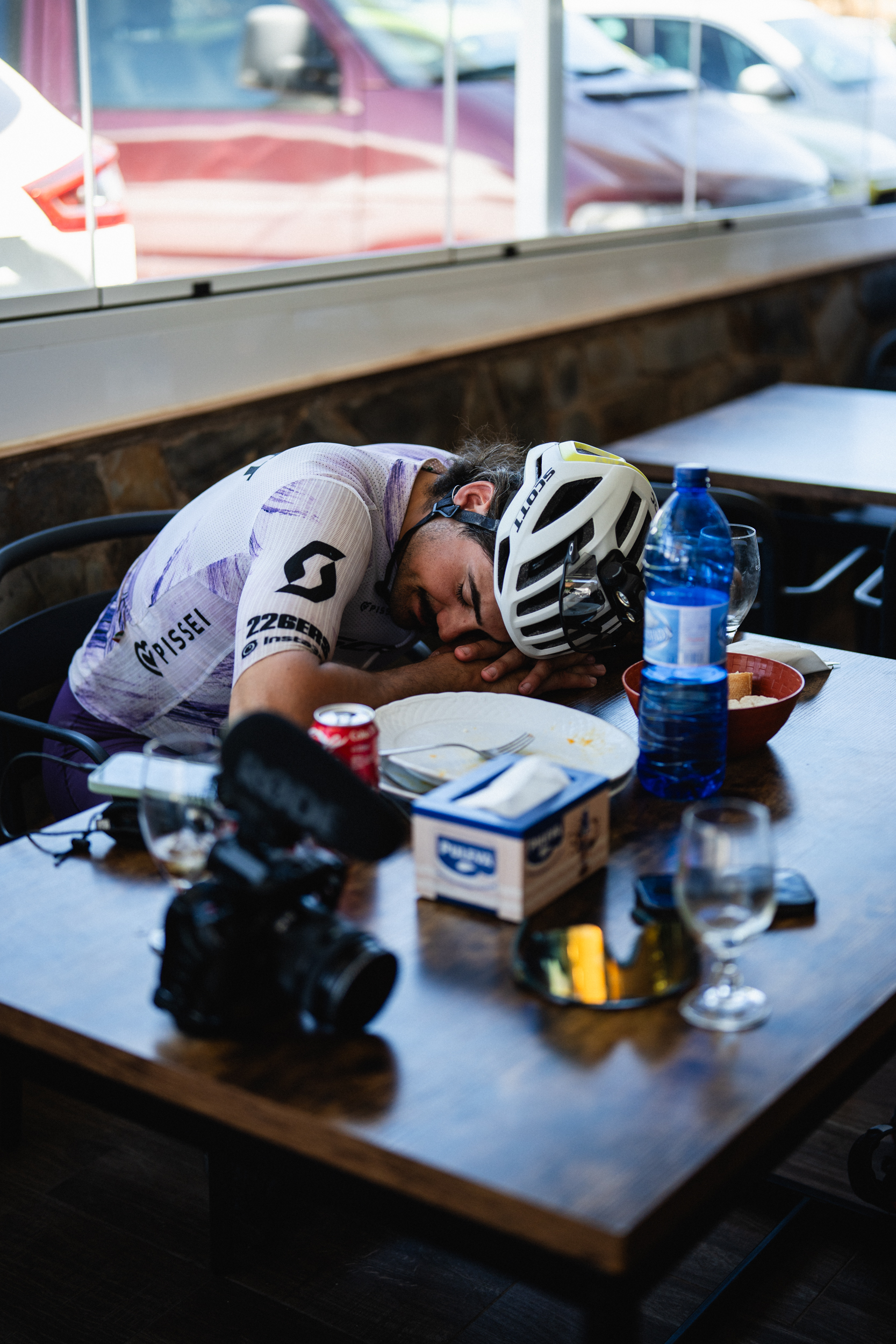
The physical and mental demands of the odyssey take their toll on the riders
BADLANDS
Grinding on… thanks to the restorative magic of madeleines
The first race was different. I wasn’t scared. I had been suspended in a peaceful ignorance, full of blind trust that my physical preparation could match the demands of the course. This year, when I sat on the start line at 8am on August 31, I knew better.
I had been training for up to 25 hours a week. I was lighter, stronger, more skilful than ever before. I had even learnt Spanish. Having travelled early to Granada, I was intimate with the heat and the sheer grinding difficulty of the terrain, with the details of the course — roughly 15,000m of elevation, crossing everything from high mountain to the godforsaken beach — and in truth, I wasn’t sure I had the heart for it. Again and again I asked myself in training: would it not be better to stop now?
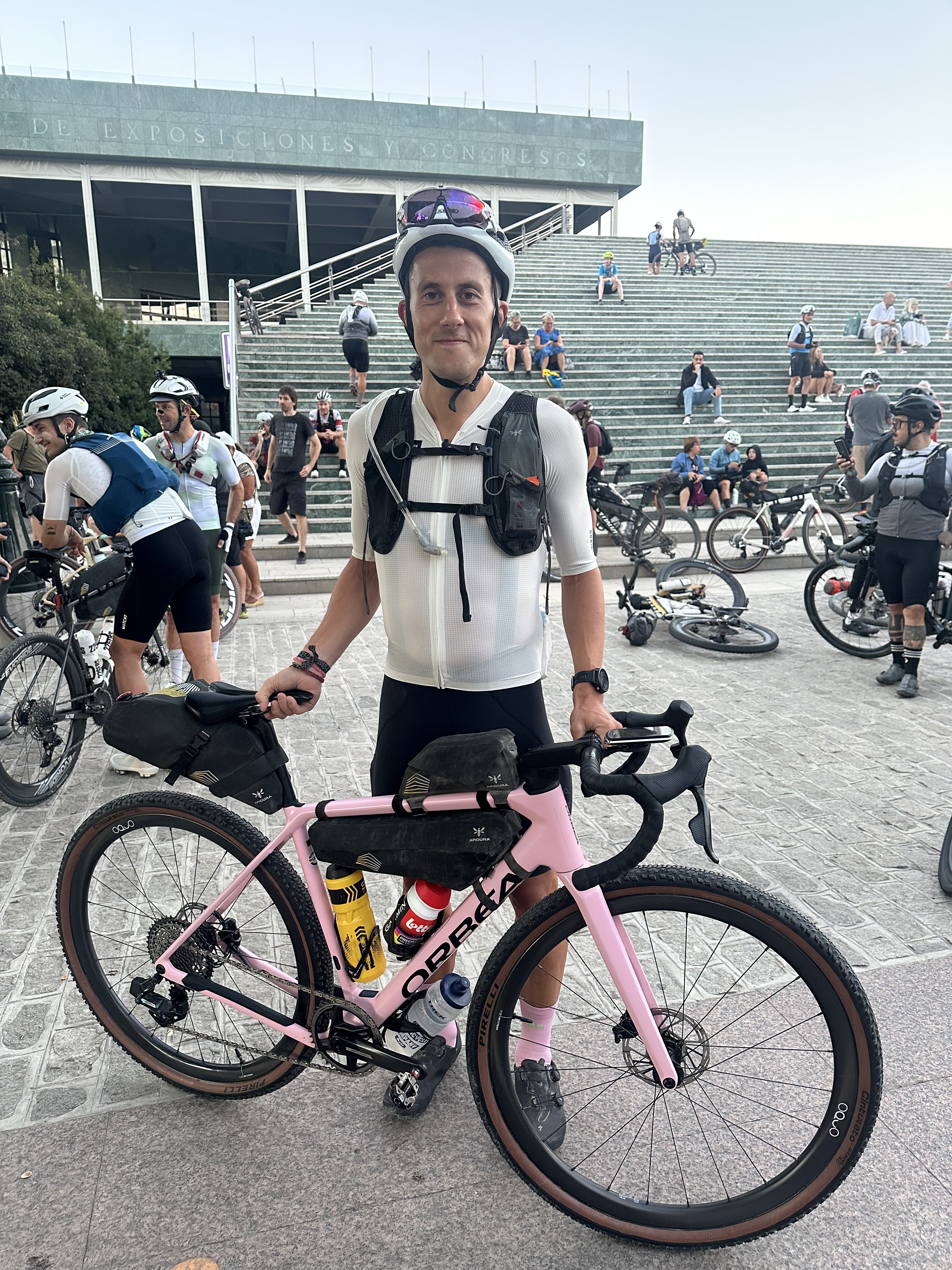
David and his fellow riders prepare to set off from Granada
Perhaps it was this fear that pushed me too hard out of the gate. During the exacting first section, from Granada to La Peza (62km) — 900m of ascent in 20km through the forest of Sierra de Huétor — I strained towards the top ten. I was overreaching. I shovelled down energy gels to compensate. Nausea settled heavily in my stomach.
Just short of 100km, my resolve started to waver. Neither because it had cost me more physically than I expected, nor because I’d had to stop briefly to repair a bottle cage, but because ahead of me I could see only the chance to break even. A whole day and night of effort — still 260km — just to repeat my own failure. Do so again, I admitted to myself at last, and it will be more crushing than the first.
Read David’s account of his first Badlands attempt last year
I sought refuge in Villanueva de las Torres (155km). The barflies had yet to fill the stools where they could ogle our dust-covered procession, but I knew this place, its comforting buffet of sweets and snacks, a leaderboard above the bar, a pile of sandwiches wrapped in foil. I bought two and ate both rapidly. I devoured fistfuls of sweets, and washed them down with water and Coca-Cola.
By the time I left Gor (227km) at about 9.30pm, I had settled myself. But the restorative magic of those sandwiches in Villanueva was hard won. I had to lug my bellyful of bread to the Mirador de los Buitres (Viewpoint of the Vultures) — a climb of loose rock, with an opening 3km at more than 9 per cent — before they dampened my nausea and strengthened my legs through the Gorafe Desert. Another round, served with madeleines and a first caffeine gel of the race, then lifted my morale further before I rode into the pine forest of Sierra de Baza. Alto de Velefique was a night’s ride away.
All I could do was hope
I had fallen far and I had landed hard, and my chances of escaping intact appeared vanishing. To be in the same place, at the same time; to have seen almost nothing — just darkness — and to have collided with so similar a fate, it was too uncanny for my wired mind.
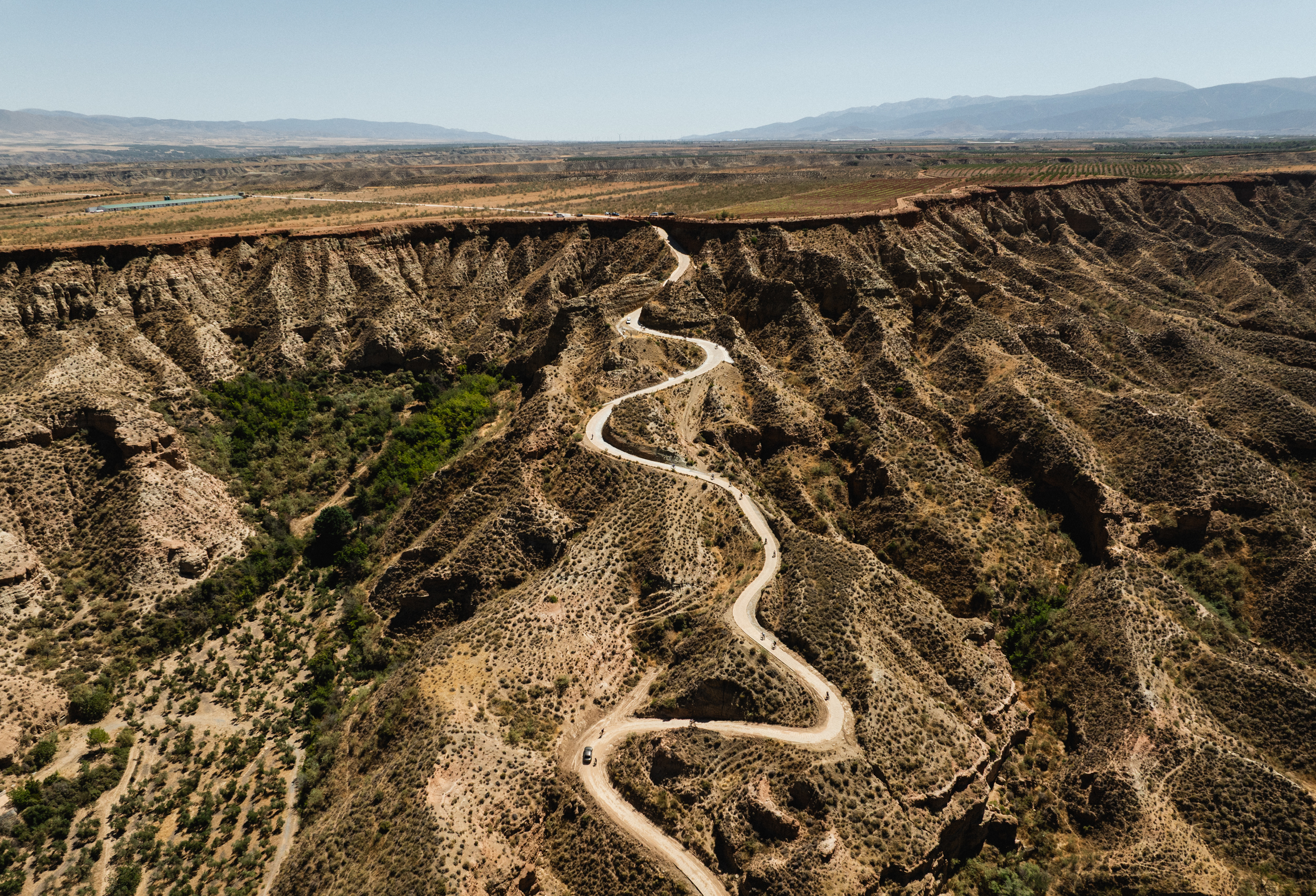
One of the long and winding roads that Bates negotiated on his 58hr 1min purgatorial journey
BADLAND
I lifted myself on to my feet and scrambled back on to the track. From there, I understood the trajectory of my fall: about two metres, missing the sharp downward slope and landing on the forest floor. My outstretched arms and chest had taken the impact. All I could do was check myself over and hope.
My helmet was intact. My gears still worked. There were no rips or scrapes that I could see — no obvious source of pain — but I had learnt last year how powerful and fleeting an anaesthetic adrenaline could be. Nervously, I started to clip in. Only as I was leaving did I realise that I had lost my phone in the fall. I returned to the forest. Mercifully, I found it unbroken on the ground. To lose it would not have been immediately terminal — I had my cycle computer for directions — but when at last I descended Alto de Velefique, I thought nothing of redemption.
More like a stag-do than an athletic endeavour
Twenty minutes of sleep was not enough. Not enough to clear the crash from my mind, nor the pain from my neck, nor the nausea that persisted in the coils of my stomach. But when I woke once again in the open shelter in Velefique — 4.30am this year, stars above clear as spring rain — I had an idea at least that I was OK.
And I was lucky, in a sense, that the track to Uleila de Campo (358km) was mercilessly rough and technical. I wondered at my own self-destructive fortitude the year before — “How did I ride this with a broken wrist? Was I tougher? Have I lost some force since then?” — but I was distracted from interrogating any damage I might have done to myself a few hours before. In Tabernas town (389km), I used the bathroom, ate two tostadas, drank an espresso and — having been cradled towards sleep by the gentle descent from Uleila — found a bench and set an alarm for 15 minutes.
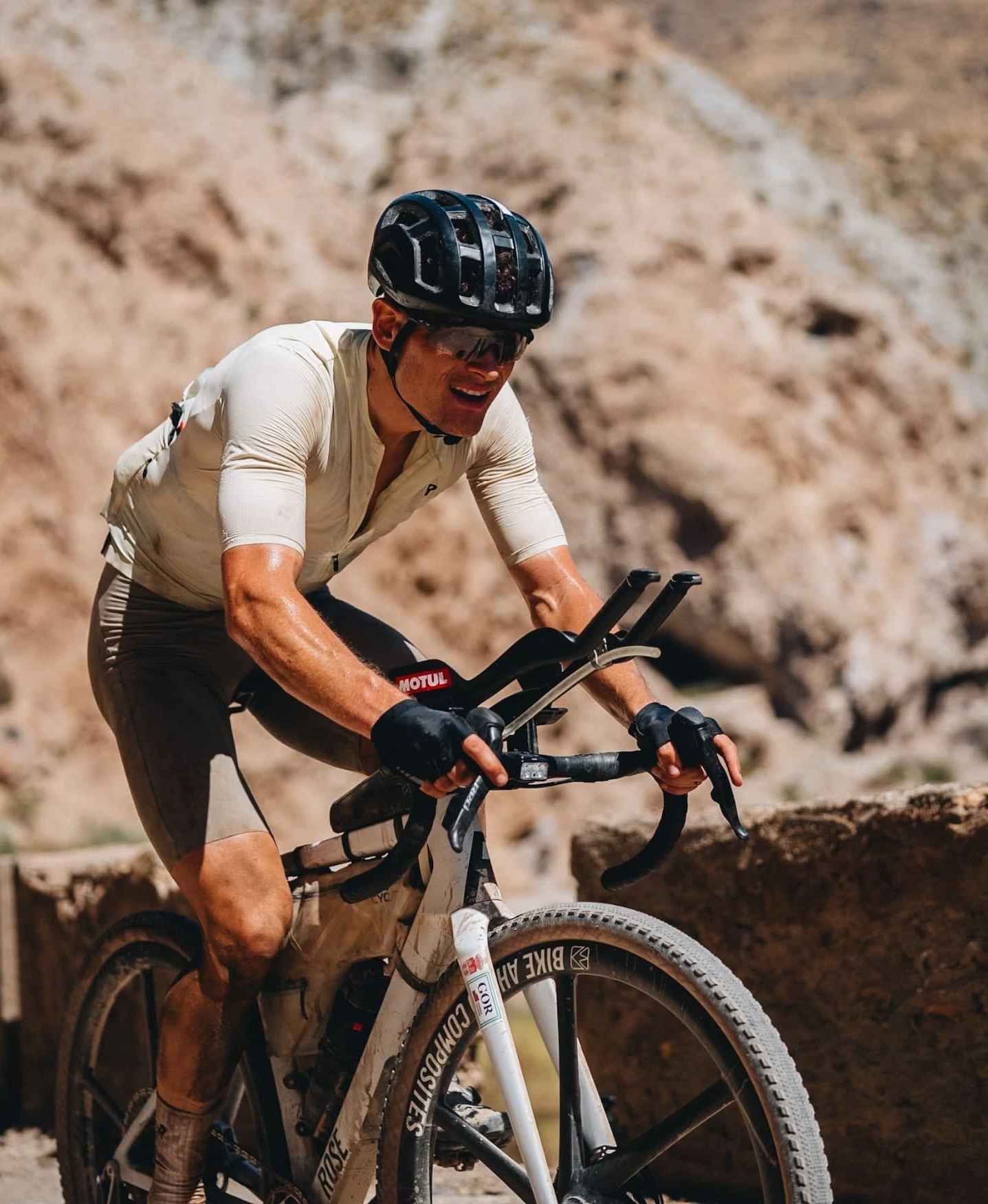
Rick Steffen, a firefighter from Germany who crashed out of last year’s race, triumphed this time around
BADLANDS
I pushed on. Emaciated, exhausted, embalmed by the unmistakable stench of my own dried piss, I rode through the Tabernas Desert to Cabo de Gata. Soon, I was talking to myself aloud. And what bubbled from my mouth was not fatigue-induced mysticism, but the mundane language of a Spanish supermarket. “Quieres copia?” I asked myself. “Necesitas bolsa?” I wondered aloud. Did I want a receipt? Do I need a plastic bag? No. Neither would have been much help, but through the arid middle of the race — the beauty all around by then just a backdrop to my psychodrama — this torrent of shite was my company. I laughed to myself. Was it happiness? Or delirium? Either way, it had begun to feel more like a stag-do than an athletic endeavour.
It was here — the driest place on the continent — that I realised I was physically capable of reaching the end. Clearly, the course could still incapacitate me, but until then the choice was mine. At times it was easier: reduced to tears for 15 minutes by the encouragement of a stranger, I could do nothing but continue. At others — fighting a headwind for hours on the road to Almería — I fantasised about falling, about blessed early release.
Stay awake or else…
At 11pm on Monday, September 1, after a hot meal and a 15-minute nap on the beach in Almería (569km), I rode into the hazy no man’s land of a second sleepless night. By then, I knew from the live leaderboard on my phone that the race winner — Rick Steffen, a firefighter from Germany who also crashed out of last year’s race — had finished. In the 38hr 15min it took him, he stopped for a total of 75 minutes.
No one else finished before midnight on the second day. This is one of the problems posed by the race; it is too long to complete before a second night falls, but not long enough that “real” sleep is an expedient strategy. In this new darkness the whole project was reduced to the sort of game that ten-year-olds play at sleepovers: stay awake or else.
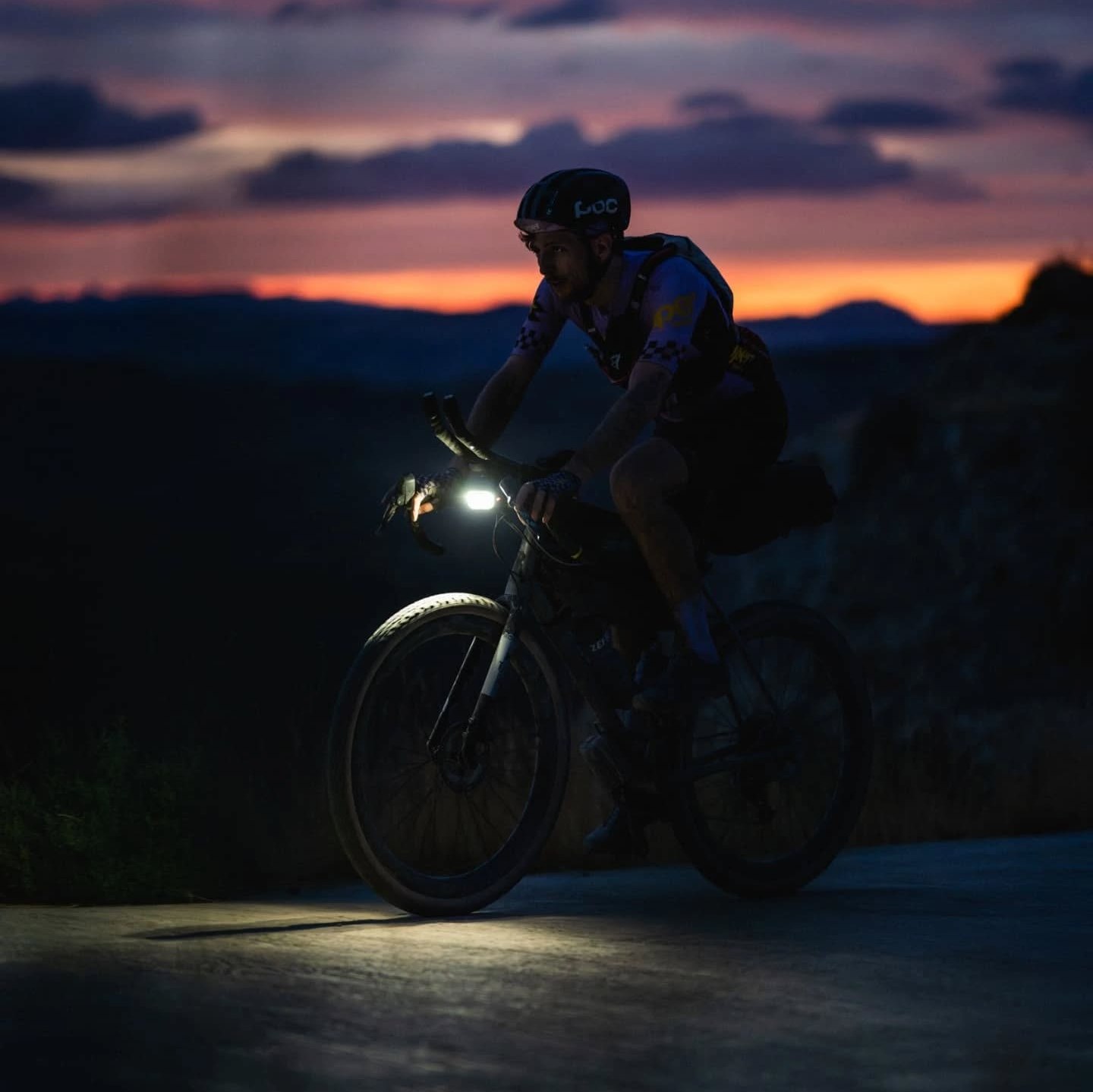
The night riders had to contend with sleep deprivation and extremely limited visibility
BADLANDS
Across Camino Enix (15.4km at 4.2 per cent) and then from Felix to Chanata (17km at 4 per cent), I had to stop three times. I thought little of the gradient; my body’s only demand was for sleep. And, goodness, my standards slipped. First, it was a bench, then just a rocky patch of ground at the side of the trail. Still, I was ushered to sleep in an instant. How unreal those moments seem now: the things we can bring ourselves to do in the wilderness when the demand is pure. Two days before the race I met a German rider who, during a mountain bike race in Greece, had licked the inside of her shoe to retrieve some chocolate she might have seen there.
Twice, I woke after 15 minutes with a buzz of energy that seemed revelatory but, with no visual stimulus beyond my front light and the endless dark, turned rapidly to a drowsiness for which there was a single solution. Only when I awoke a third time, to see the sun rising full and red on the descent to Iliar (648km), did these morsels of sleep provoke a more lasting response.
End of the road, but not the end of the journey
I had imagined the end more frequently even than I had pictured the redemption that never arrived on Alto de Velefique. I would dance in the fountains on Paseo de los Tristes, I would scream and I would cry beneath the vast shadow of the Alhambra. At the very least — in this moment of catharsis, 22 months in the making — I would hug my mum, who had driven the length of Spain to support me for a second consecutive year.
By daybreak on the third morning — in Iliar (648km), more tostadas, more coffee — I could see this end but it was not exactly close. “Only 170km to go,” my mum posted in our WhatsApp group. Only! My mind was soft, blunt. I tried repeatedly to order cake (torta) for a Dutch rider, when what he wanted was an omelette (tortilla). I had a dull pain in the front of my left knee, an ache in my left shoulder, swollen lips, three tingling fingers in my right hand, contact lenses glued to my eyeballs, shorts stuck to my legs by the accumulation of dried gel, and arse cheeks that felt as though they had been slowly sanded down to the bare nerves.
For hours, through the final long climb in the Alpujarra (11.8km at 6.6 per cent) and a succession of dried riverbeds — toiling along a slender rideable section, between bars of soft silt and rock-hard 4×4 tracks that rattled my weary head — these ailments went turn for turn at the forefront of my mind. For a period they were eminent, then they retreated.
After all that time, the thought of giving in had not been extinguished. That is the paradox: when, the year before, to quit was my only real option, it was intolerable; now, it lingered suggestively, a promise of comfort, if only I could set down my obstinance. More forceful was the desire never to return, never again to chase myself so deep into exhaustion. When I was home I would host dinner parties and frequent galleries. I would forget all of my training protocols and live instead with consummate lightness.
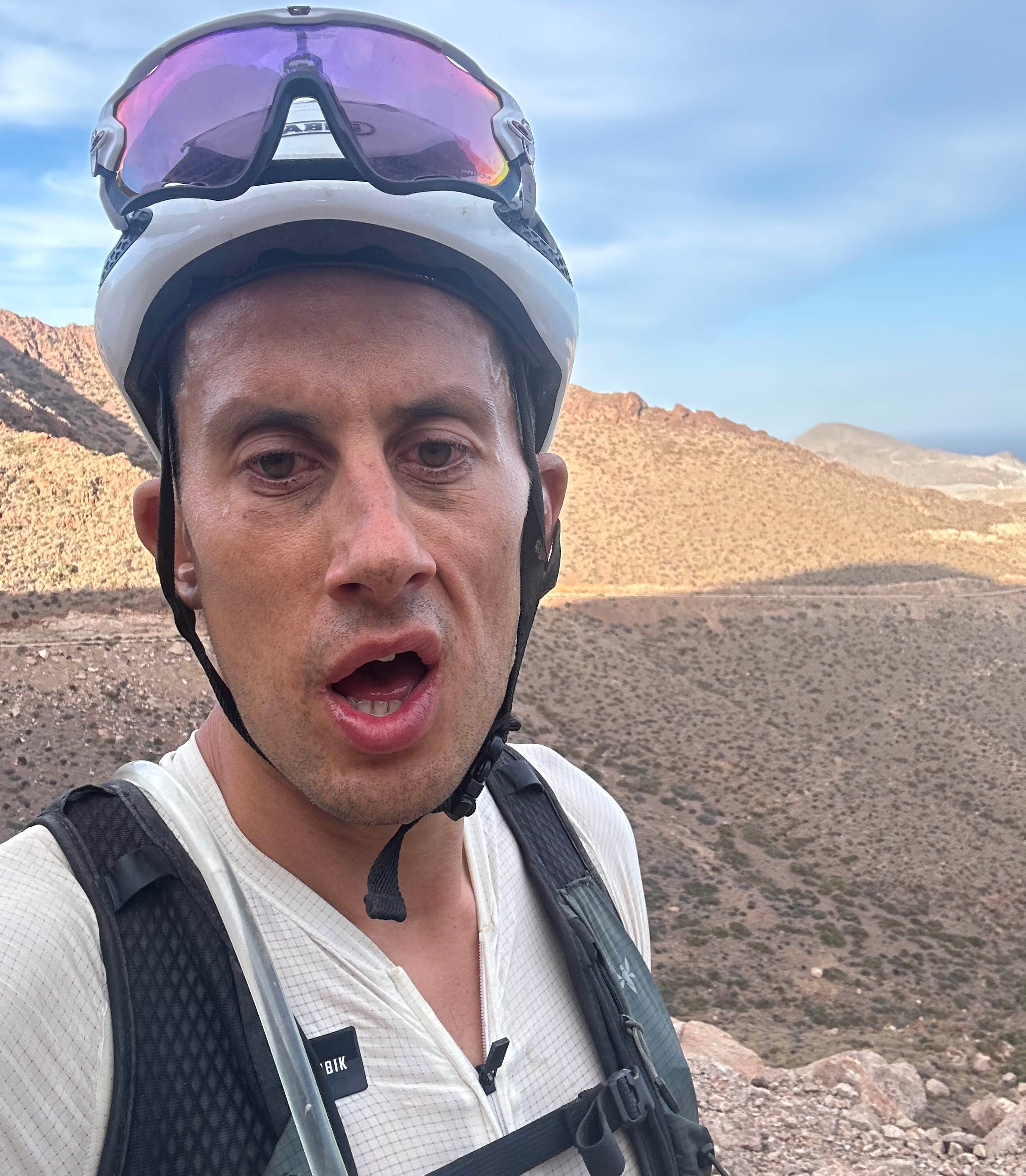
Wild and haggard, the terrain takes its toll on David
BADLANDS
But my body had one final trick to play. Riding into La Calahorra (732km), energy began to rise from some untapped store, blotting out the pain that had circled all morning. I was stronger than I had been in a day. For hours, it held — right to the uppermost point of the final climb, a cruel 1.7km at 11.7 per cent. And then, with 5km remaining, almost all downhill, my body abandoned its pretence of resilience. The old pains emerged, no longer in rotation, but altogether: knee, neck, shoulder, eyes, arse.
It no longer mattered. I swung down the hill from Granada’s old gypsy quarter and on to Paseo de los Tristes. After 58hr 1min — after 90 minutes of sleep, 27,250 calories spent, 44 energy gels and more tostadas than I can remember — I crossed the finish line in 26th place. I did not dance in the fountain. I did not scream. I did not cry. I hugged my mum. “Never let me do that again,” I said. I meant it, too.
And yet, I no longer feel that way. Out there, burdened by the heavy load of my own doubt, I was at times inundated by the force of no. Against this, every onward pedal stroke became a silent response; each one a small utterance of yes, until that final exhausted affirmation, the end.
That is a powerfully addictive feeling, mitigated only by the dwindling memory of my suffering. In his memoir of crossing the Antarctic with Ranulph Fiennes, Shadows on the Wasteland, the explorer Mike Stroud describes the many vows he made in the wild. “I can clearly remember saying to myself every day of the journey, ‘I must never do this again,’ ” he wrote. Instead, he would become a model father, build the doll’s house his daughter had always wanted. Of course, he never did. And since I returned, I have spent far more time on my bike than in galleries or at dinner parties.
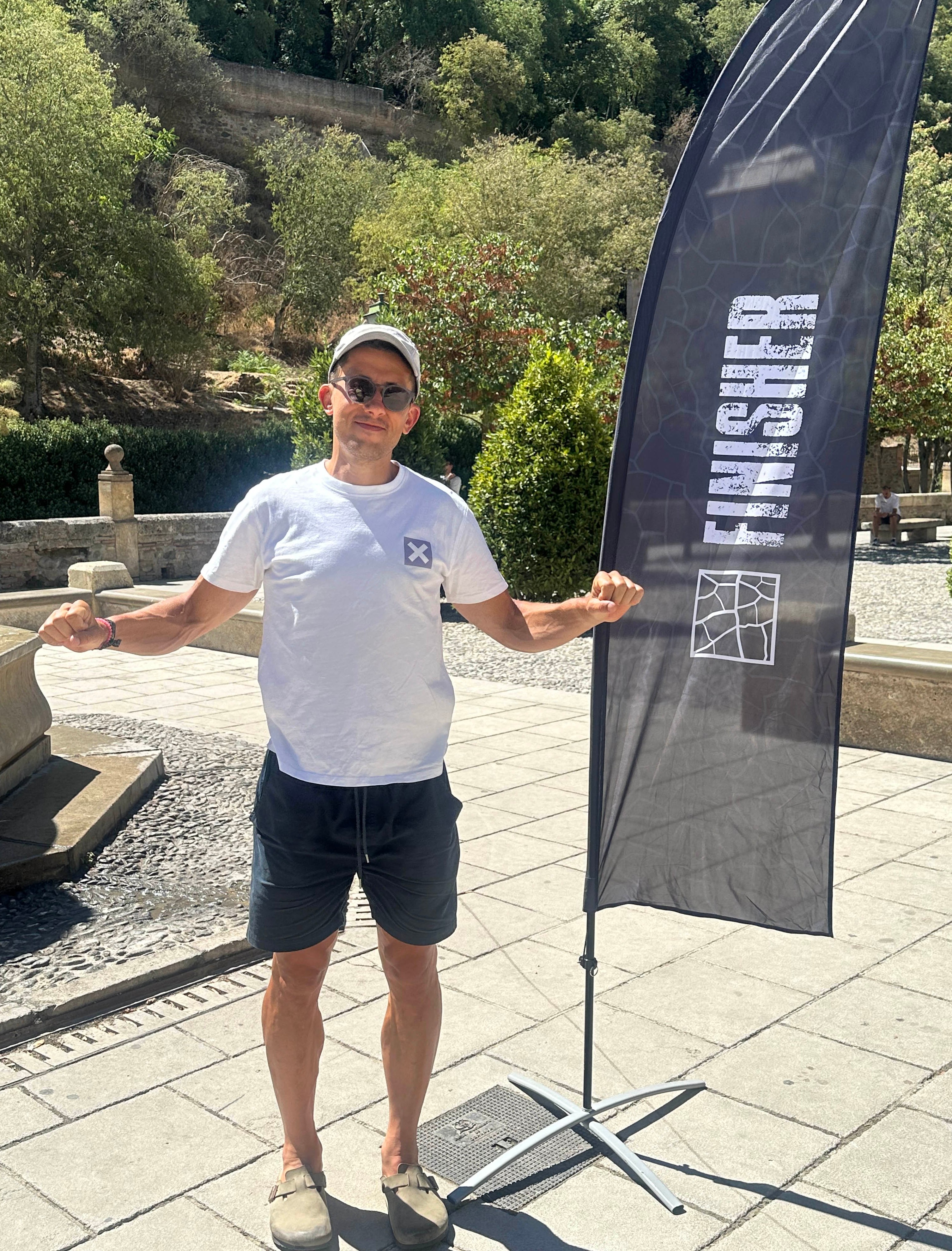
At the end, David hugged his mum and said: “Never let me do that again”. Now, he’s not so sure…
BADLANDS
It is something towards which I have always tried to maintain some scepticism. I have tried to acknowledge that behind these obsessive pursuits, there is often neglect — of family, or children or emotional needs. And that this neglect is often a painful repetition. Because those of us who require our drawn-out penitence — the lost boys and girls — are often chasing some misplaced purpose or affection or approval.
But now I wonder if whatever sceptical distance I had imagined has not collapsed entirely. I can look at myself and make guesses: that I am another lost boy, wounded by the virtual absence of a father figure; that this is all one hopeful but doomed ride in search of a hug or a nod that I never received on the side of a rugby field. But I have no interest in playing the victim. Because if it was neglect that took me out there, into that wild country whose beauty lives on in my bones; if it helped me turn the pedals over and again, to hear no a thousand times and respond conclusively with a yes, then my only sadness is that the adventure is over.

